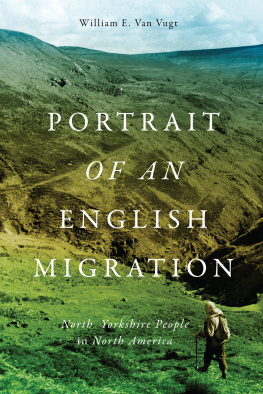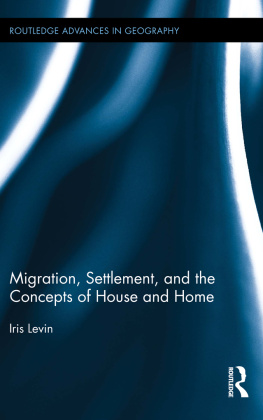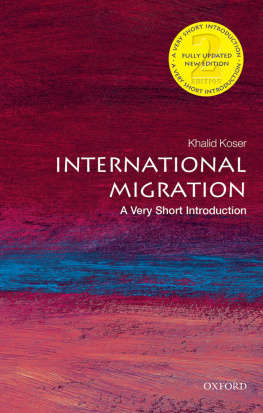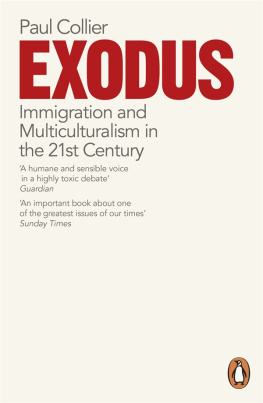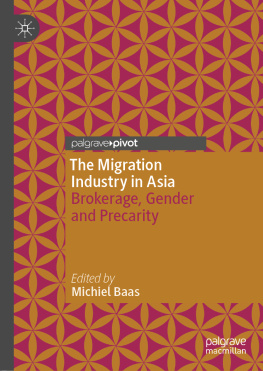Migration Practice as Creative Practice: An Interdisciplinary Exploration of Migration
EDITED BY
DIEU HACK-POLAY
University of Lincoln, UK
ALI B. MAHMOUD
University of Wales Trinity Saint David, UK
AGNIESZKA RYDZIK
University of Lincoln, UK
MAHFUZUR RAHMAN
University of Lincoln, UK
PAUL AGU IGWE
University of Lincoln, UK
GARY BOSWORTH
University of Lincoln, UK
United Kingdom North America Japan India Malaysia China
Emerald Publishing Limited
Howard House, Wagon Lane, Bingley BD16 1WA, UK
First edition 2021
2021 by Emerald Publishing Limited
Reprints and permissions service
Contact:
No part of this book may be reproduced, stored in a retrieval system, transmitted in any form or by any means electronic, mechanical, photocopying, recording or otherwise without either the prior written permission of the publisher or a licence permitting restricted copying issued in the UK by The Copyright Licensing Agency and in the USA by The Copyright Clearance Center. Any opinions expressed in the chapters are those of the authors. Whilst Emerald makes every effort to ensure the quality and accuracy of its content, Emerald makes no representation implied or otherwise, as to the chapters' suitability and application and disclaims any warranties, express or implied, to their use.
British Library Cataloguing in Publication Data
A catalogue record for this book is available from the British Library
ISBN: 978-1-83867-766-4 (Print)
ISBN: 978-1-83867-765-7 (Online)
ISBN: 978-1-83867-767-1 (Epub)
Table of Contents
Dieu Hack-Polay
Dieu Hack-Polay
Ali B. Mahmoud and Mayssa Al Atrash
S. Krithika
Omolola S. Olarinde
Aaron T. Sigauke
Jessica Msofe and Michael Terborg
John Opute, Dieu Hack-Polay and Michael Rigby
Mahdieh Zeinali, Agnieszka Rydzik and Gary Bosworth
Jennifer Onyekachi Igwe, Anulika Nwajiuba and Paul Agu Igwe
John Mendy
Dieu Hack-Polay
Ali B. Mahmoud and Shehnaz Tehseen
Irene Ikafa
Magdalena Read
Mahfuzur Rahman and Morsaline Billah
Dieu Hack-Polay
List of Contributors
| Dieu Hack-Polay | University of Lincoln, UK |
| Ali B. Mahmoud | University of Wales Trinity Saint David, UK |
| Mayssa Al Atrash | Independent Researcher, Belgium |
| S. Krithika | Jawaharlal Nehru University, India |
| Omolola S. Olarinde | Elizade University, Nigeria |
| Aaron T. Sigauke | University of New England, Australia |
| Jessica Msofe | Lakehead University, Canada |
| Michael Terborg | Prince George's County Public Schools, USA |
| John Opute | London South Bank University, UK |
| Michael Rigby | London South Bank University, UK |
| Mahdieh Zeinali | University of Lincoln, UK |
| Agnieszka Rydzik | University of Lincoln, UK |
| Gary Bosworth | Northumbria University, UK |
| Jennifer Onyekachi Igwe | University of Plymouth, UK |
| Anulika Nwajiuba | Alex Ekwueme Federal University, Ndufu-Alike, Nigeria |
| Paul Agu Igwe | University of Lincoln, UK |
| John Mendy | University of Lincoln, UK |
| Shehnaz Tehseen | Sunway University, Malaysia |
| Irene Ikafa | University of New England, Australia |
| Magdalena Read | University of Lincoln, UK |
| Mahfuzur Rahman | University of Lincoln, UK |
| Morsaline Billah | University of Lincoln, UK |
Foreword
During the Covid-19 crisis, migration came to a sudden standstill as countries closed their border to contain the spread of the virus. Since the beginning of humanity, however, migration has been the norm, even though regularly, aided by whatever reason, countries have tried to stop migration, and in particularly stopping people from entering their countries or kingdoms. Migration has always been happening throughout history, and people will continue to migrate across the globe when countries are opening again. However, migration has also been at the forefront of a darker narrative around protection of country's own people against the foreign intruder. Racism, xenophobia and populism have traditionally evolved around the notion of the stranger, who wants to migrate and take possession of some of the wealth or resources of a country and their people. It is sad to ascertain that this is not something from a dark past, but alive in our current times, where right-wing populism is on the rise again and countries are not just closing their borders to contain the spread of Covid-19, but also to keep immigrants and refugees out of their countries.
To be able to effectively understand and address such issues, it is needed to understand better the dynamics underpinning migration. This book edited by Dr Dieu Hack-Polay and colleagues offers an interdisciplinary approach to the study and understanding of migration as creative practice. It focuses on the social and societal issues and construction of migration, and offers great understandings of how migration is viewed in contemporary society.
This book is an enormously important and timely book that offers 17 different and great chapters on migration, which will help the reader understand better how migration can be perceived in our contemporary societies. It does so not only by offering theoretical understandings of the subject matter, but also by offering multiple chapters on how migration can be studied methodologically. Using a number of innovative methodological techniques, such as narrative and metaphor research methodologies, this book will further our understanding of how migration can be studied more effectively.
Beyond all, this book presents both statistics and numbers on the impact of migration and how discourses on migration are constructed, as well as more particular narratives of migration experiences. Jointly they picture an academic topic that is extremely important in our society, and is a must-read for anyone who is concerned about the ever-growing hostility of particularly Western countries towards immigrants and non-whites more broadly. To understand the causes of such hostility is necessary, yet insufficient, and we need to be engaged in more debate around how we can effectively change our societies for the better, and be truly welcoming nations for anyone who has to (involuntarily) leave their country due to famine, war or persecution.
While the Covid-19 crisis has (once again) shown the detrimental side-effects of globalism through the rapid spread of the deadly virus across the world, we are now faced with a rising need to sustain our communities locally. This means economic independence of communities is highly needed to address the devastating effects of our human invention to move globally, and ship goods across the globe, with all associated pollution. However, this may never mean that we should de-identify as anti-globalists who stop to care about their fellow human beings wherever in this world, and who are less fortunate and privileged. The duty of Western countries remains to be compassionate and to stop neo-colonial practices such that modern forms of exploitation, including the negative portrayal of immigrants, can become part of history once and for all.



